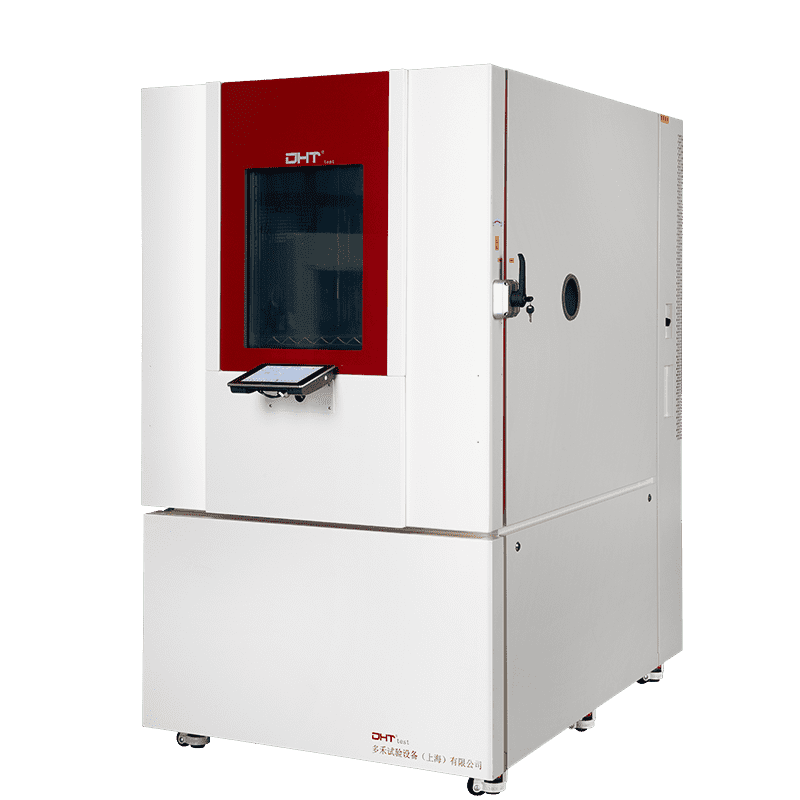Written by Robin
Senior Engineer, Doaho Test (DHT®)
What is a battery test chamber?
A battery test chamber is a specialized piece of environmental simulation equipment designed to evaluate the reliability and safety of various types of batteries and battery components. By precisely controlling temperature, humidity, and other environmental parameters, the chamber can recreate extreme operating conditions to help engineers identify potential risks in advance.
Common test procedures include:
- High and low temperature cycling: Simulates seasonal climate changes and their impact on battery performance.
- High temperature and high humidity testing: Verifies a battery’s protection capability in humid conditions.
- Thermal shock testing: Assesses stability when the battery is suddenly exposed to drastic temperature changes.
- Safety-related testing: With integrated explosion-proof and fire protection features, these tests evaluate risk management when failures occur.
In short, a battery test chamber is the “exam room” that every battery must pass through before entering the market, ensuring it remains safe and reliable under complex real-world conditions.
Why are battery test chambers essential for battery companies?
The reasons are clear:
- Ensuring safety: Battery failures can lead to overheating, leakage, or even fire, resulting in severe consequences.
- Enhancing reliability: Accelerated aging and extreme environment testing help predict battery lifespan and reduce risks of recalls or costly after-sales issues.
- Meeting certification requirements: Whether for domestic GB/T standards or international certifications such as UN38.3 and IEC, batteries must demonstrate performance under strict conditions.
- Shortening development cycles: By rapidly simulating real environments, test chambers speed up verification, enabling companies to launch products faster.
Thus, a battery test chamber is not just a tool for R&D—it is the guardian of product quality and brand reputation.
Do I need to finalize all test requirements before contacting a manufacturer?
Many customers worry they must have every detail of their testing plan mapped out before approaching a manufacturer. In reality, that’s not necessary.
A professional test chamber manufacturer will analyze your needs based on your industry, product type, and applicable standards, and then provide tailored solutions. All you need to clarify is:
- The type of battery you are testing (EV batteries, energy storage, consumer electronics, etc.);
- The performance priorities (safety, lifespan, durability, etc.);
- Whether compliance with specific standards is required (e.g., UN38.3, IEC 62660, AEC-Q200).
The rest can be handled by an experienced engineering team. Partnering with a manufacturer like DHT®, with proven expertise, will save you significant time and costs.
Can battery test chambers support different types of batteries?
Absolutely. Battery test chambers are designed to accommodate a wide range of battery types, including:
- Lithium-ion batteries (widely used in EVs and consumer electronics);
- Solid-state batteries (an emerging technology with stricter thermal and humidity requirements);
- Nickel-metal hydride (NiMH) and lead-acid batteries (still relevant for industrial and storage applications);
- Battery modules and packs (such as EV battery packs).
Different battery types demand different testing and safety considerations. For example, EV battery module testing requires larger chamber volumes and enhanced safety mechanisms.
Why are safety features so important in battery test chambers?
Safety is always the top priority in battery testing. Under extreme conditions, batteries may overheat, leak, or even explode. Therefore, a reliable battery test chamber must incorporate multiple safety features, such as:
- Explosion-proof pressure relief devices: Release gas in the event of abnormal pressure buildup.
- Flame detection and automatic fire suppression systems: Instantly extinguish flames upon detection.
- Over-temperature and overcurrent protection: Prevent risks caused by system malfunctions.
- Gas exhaust and filtration systems: Discharge harmful gases safely to protect lab personnel and the environment.
These measures safeguard not only the test samples but also the people and facilities involved in testing.
Can battery test chambers be customized?
Yes. Since testing requirements vary widely across different battery applications, customization is a common service. Customers can specify:
- The temperature and humidity range and precision;
- Chamber size and sample capacity;
- Additional safety modules such as gas monitoring or explosion-proof design;
- Compliance with international standards and certifications.
DHT® has extensive experience in delivering customized solutions for applications ranging from EV batteries and large-scale energy storage to consumer electronics.
Can I monitor battery testing remotely?
With the rise of smart technologies, modern battery test chambers are no longer “closed black boxes.” Equipped with intelligent control systems, users can:
- Monitor real-time temperature, humidity curves, and test progress via touchscreen;
- Export data and reports through network interfaces (USB, Ethernet);
- Access testing status anytime via PC or smartphone through remote monitoring platforms;
- Receive alarm notifications immediately if abnormal conditions occur.
This greatly improves testing efficiency and safety, while supporting modern digital data management. However, not all brands or models offer this feature by default—it is often an optional configuration, so it’s important to confirm before purchase.
Contact DHT® for a professional solution
In today’s battery industry, where safety and performance are the ultimate competitive advantages, advanced test equipment is no longer optional—it’s essential.
At DHT®, we understand the critical role of battery reliability testing. With deep expertise in EV, energy storage, and consumer battery applications, we deliver more than just equipment—we provide data-driven reliability solutions.
Our test chambers are designed to comply with GB/T, UL, IEC, and other international standards, featuring precise thermal control and multi-level safety systems. They support the entire product cycle, from R&D validation to mass production quality assurance. DHT®’s engineering team also specializes in developing tailored solutions for high-energy-density and next-generation solid-state batteries.
By partnering with DHT®, you gain a trusted collaborator dedicated to ensuring the safety and reliability of every single battery. Let precise testing become the strongest guarantee for your products’ success in the market.


